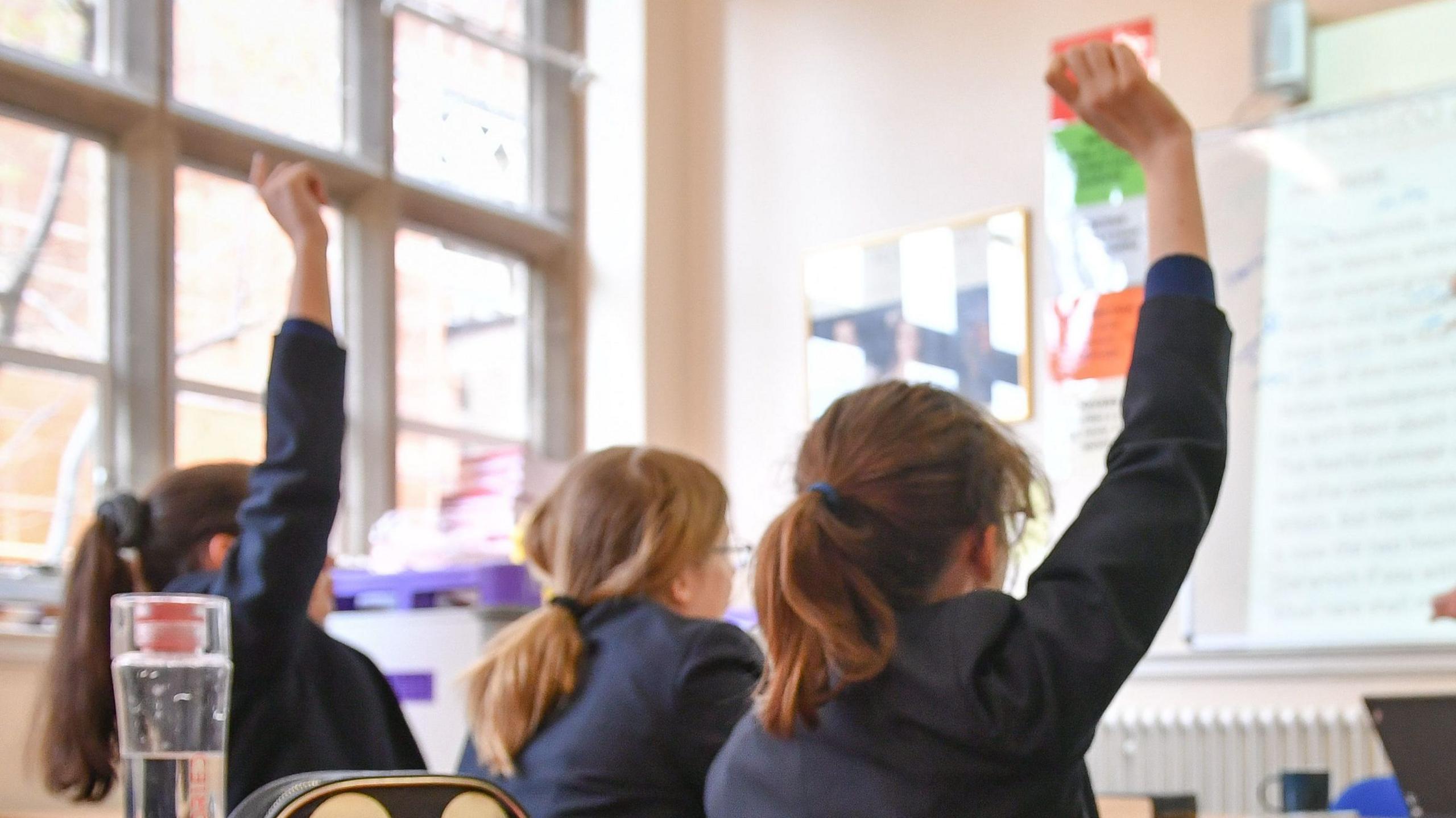Schools urged to talk about upskirting and sextortion

- Published
Schools are to be encouraged to teach young people about topics like upskirting, downblousing, cyberflashing and sextortion, MLAs have heard.
An official from the Council for the Curriculum, Examinations and Assessment (CCEA) told a Stormont committee that teachers were "crying out" for relationships and sex education (RSE) teaching materials.
Roisin Radcliffe from CCEA told assembly members that there were "units coming out on upskirting, downblousing, cyberflashing and sextortion".
CCEA provides online resources and lessons for schools on Relationships and Sex Education (RSE).
Schools given sex education class delivery guidance
- Published5 January 2024
Upskirting and cyber-flashing laws come into effect
- Published27 November 2023
'False information campaign' about sex education
- Published8 August 2023
"We're not telling everybody 'go out and have sex,' that is not the case," she said.
"I think everybody thinks they're talking about sex all the time but most of the young people we meet are interested in the relationships and how to talk to someone," she said.
"That's how basic it is.
"They don't know how to talk to each other."
Ms Radcliffe told MLAs about other units: "We've perimenopause, menopause, masculinity and the influence of positive role models."
Police in Northern Ireland can now charge people with upskirting, downblousing and cyberflashing after changes to the law.
MLAs on Stormont's Education Committee have started an inquiry into the provision of relationship and sex education in schools in Northern Ireland.
They heard from a number of witnesses about RSE on Wednesday.
CCEA recently removed guidance to primary schools that children could become aware that they were transgender "between the ages of three and five" from their RSE Hub.
Teachers 'crying out' for sex education resources
Ms Radcliffe told MLAs that teachers were "crying out" for tailored support to teach RSE.
She said that CCEA was also working with Cinemagic to provide schools with short films on the topics of consent and period dignity.
But the Sinn Féin MLA, Cathy Mason, questioned whether support and training for teachers would accompany the resources.
"There's a difference in a teacher being given the resource and actually having the confidence to deliver that resource," she said.
MLAs also heard that religious beliefs should not affect "scientifically accurate information" taught to pupils in RSE.
They were, though, told that changes to RSE to include teaching pupils about abortion provoked "nervousness" and "concern" among some teachers.
Post-primary schools in Northern Ireland are now required to teach pupils about access to abortion and prevention of early pregnancy in RSE.

CCEA provides online resources and lessons for schools on Relationships and Sex Education (RSE)
The chief commissioner of the Northern Ireland Human Rights Commission (NIHRC), Alyson Kilpatrick, was also among those questioned by MLAs.
She was asked a question by DUP MLA Cheryl Brownlee about how different religious beliefs were acknowledged within RSE.
"The scientifically accurate information that's given should not differ depending on the religious belief," Ms Kilpatrick replied.
"What may differ is their attitude to, for example, abortion, attitude to prevention of early pregnancy on faith grounds.
"But it shouldn't affect the scientifically accurate information that's given to children.
"That's going to be the same whether it's a Muslim family, a Christian family, a Jewish family."
Previous research from the NIHRC suggested that some schools in Northern Ireland were teaching pupils that homosexuality was wrong.
Ms Kilpatrick said that research had also found there was "no consistency" across schools in the teaching of RSE.
Ms Brownlee's DUP colleague David Brooks MLA, however, said RSE could veer "into elements of morality and faith that are usually set in the home".
The UUP MLA, Robbie Butler, said that some "young people have suffered horrendously" because RSE had not been handled well in some schools.
'Shoehorned into a school curriculum'
Principal of Lisneal College in Londonderry, Michael Allen said feedback from teachers and some young people shows that relationship and sex education (RSE) teaching materials does not meet their needs.
Mr Allen said Stormont’s support and advice on RSE to schools “is not where it should be”.
“There is a feeling amongst educators that where society needs to address something, it is shoe-horned into a school curriculum,” he said.
“Often many components of RSE policy comes down to ethical and moral debate and dilemma, and that should not just be shoehorned into schools to deal with without the proper support and without the proper staff training.
“We shouldn’t really be seen as the easy vehicle to perhaps address many of the issues - we seem to have forgotten that parents want to play a large role in the education of their children around these issues and that should not be bypassed.”